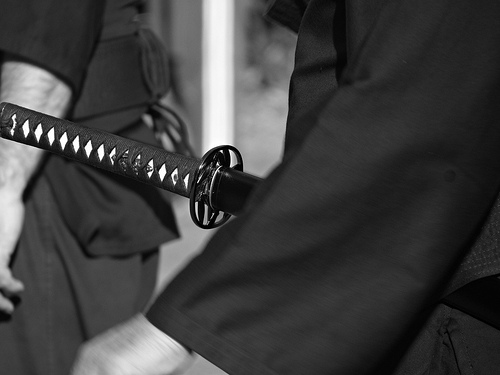

Recently I got asked: “What is the most valuable lesson from martial training for your career as a manager?” The things I believe I have learned in those 25+ years briefly flashed through my mind. But without hesitation I answered: “Execution in risky situations. Without excuses or evasions.” Let me explain!
Let’s face it!
I learned that courage was not the absence of fear, but the triumph over it. The brave man is not he who does not feel afraid, but he who conquers that fear.” (Nelson Mandela)
The instructor’s words were plain enough: “The attacker aims a front-kick at you. You step into the attack (as opposed to: safely away from it), deflect her leg. Scoop it. Then you throw her to the ground.” (See here what I mean) But the execution was not that easy. The problem: When somebody is about to kick you in the belly full force, every fiber in your body tells you to flee (as opposed to: step in). And rightly so: if you botch this, it is going to hurt – at minimum!
To make matters worse: Between the intention to attack and the instinct to flee your body might just decide to stand still. Which is the worst of all options. You just don’t stop in the middle of the road because you are unsure!
Facing risk
In Karate risky situations like that are the norm: whenever you enter a fight – be it in a tournament or during sparring – there is a real chance to loose the fight, to get hurt or even injured. For me even worse: the possibility to hurt or injure the opponent.
But that is something you have to learn to face: You can not wiggle your way out of the situation! There is no protective gear, no negotiation. You are in there with nothing more than your skills.
And if you should fail, nobody will want to hear why. There is a certain codex in martial arts not to make excuses, but to honor the mistake by working hard to be better next time.
After hundreds of hours of training this attitude becomes second nature. And it is a feeling I actually grew to like.
In real-life
I started consciously copying that behavior during university: when ever there was an oral exam, I stowed away all my learning material at home and walked the three kilometers to the campus on foot to take the exam. I took nothing with me. Again, it was only me and my skills. The remaining risk just had to be faced.
Of cause I could have tried to dull the sense of danger by taking loads of books with me or by coming up with a reason why I wasn’t well prepared in the first place. But that’s not the martial way.
Following through
It might be surprising to learn if you are not a martial artist: most of the time during a fight both opponents spend in safe distance of each other. That distance is only closed when one decides to launch an attack. This implies: when ever you attack you expose yourself. You can only hope for one of two things: you hit your target or your attack is so powerful that your opponent has her hands full to escape. Otherwise she will use the opening to overpower you. That is why a half-hearted attack kills.
This is similar to the situation described above: When you decide to step in, you have to do it without hesitation. Or you are screwed.
Raising the stakes: weapons
Things get worse when weapons are involved: do you know the martial art of Aikido? If not have a blast on YouTube! Attacks in Aikido often start with the opponent trying to grab a hand or an arm of the defender and hold on to it. The defender then uses fluent circular motions to throw the attacker.
As a beginner I often asked myself: why does the attacker not let go of the hand/arm she grabbed? Then I realized she was not grabbing an arm. She was grabbing a weapon! (In Aikido the Arm of the defender often symbolizes his sword. But the arm itself is a powerful weapon enough) Letting go of a weapon you grabbed is a certain way of having it used against you immediately. That is why letting go simply is not an option. When you decide to go for the attackers weapon you go through with it or you most certainly die.
All these examples mean one thing: you not only have to face the danger. It is equally important for whatever you do, to follow through with utter determination! Or in martial terms: You have to approach every attack with the attitude that it will be the decisive one. This is the philosophical essence expressed by the Japanese term ikken hissatsu (literally: to kill with one stroke).
Execution


Be it the decision to cancel a product or the move to develop one. Be it a marketing campaign or a code of conduct: nearly all moves in leadership involve risk. And all of them are doomed if you are not willing to acknowledge that risk and at the same time follow through with utter determination (of cause sometimes the most sensible option is to cancel. But that too is a decision to execute with determination). The managerial term for this is simply “execution“. And because it is our job to make sure it happens we are sometimes called “executives”.
Business leaders all over the globe agree that it is less important to have the perfect plan than to ensure execution of that plan. The problem is so prevalent, that there is even a name for it: strategy gap.
So we need executives that execute. Maybe they could learn some from the martial philosophy of ikken hissatsu. At least it is my most valuable learning from martial training.
Photo by Meru Fumoto 

Leave a Reply